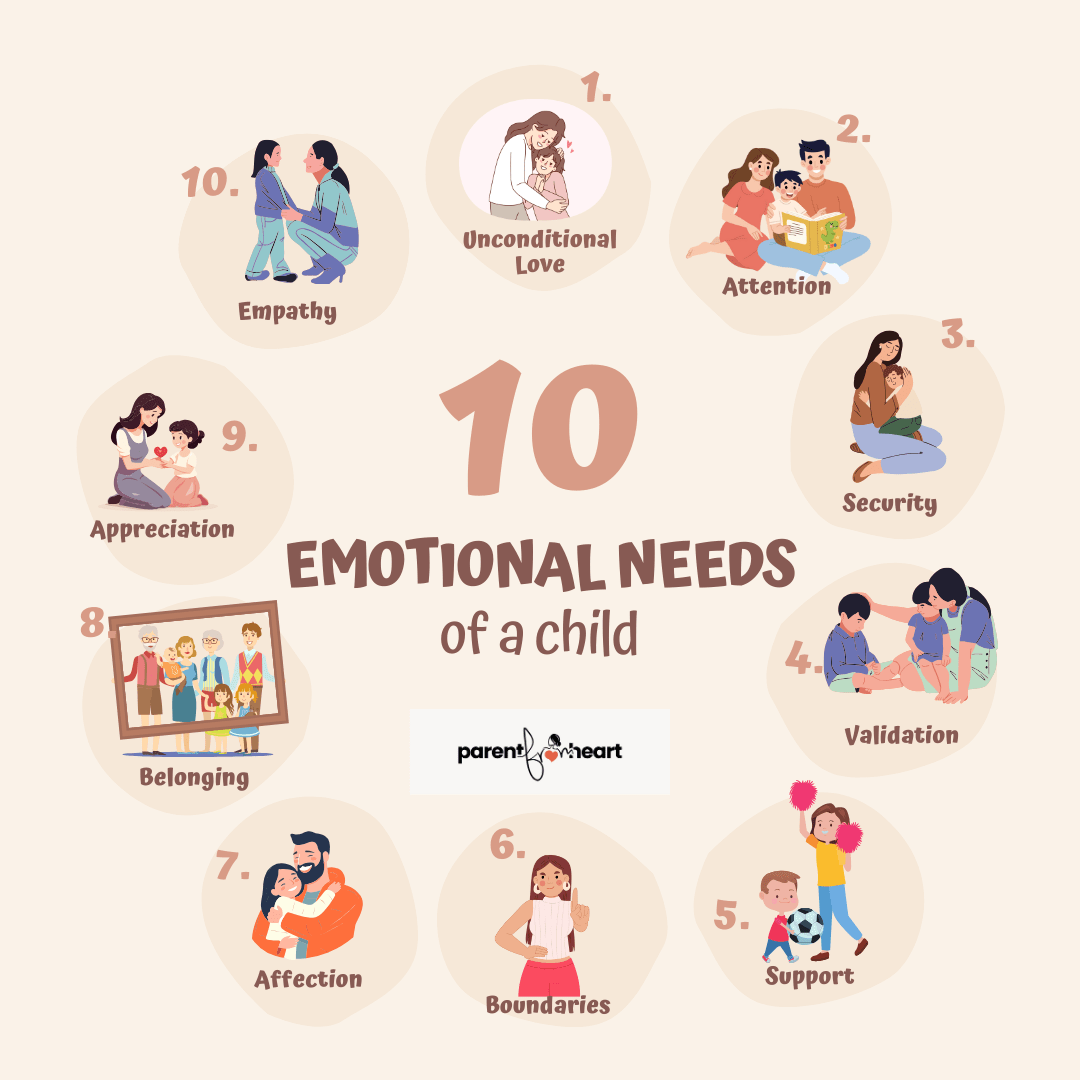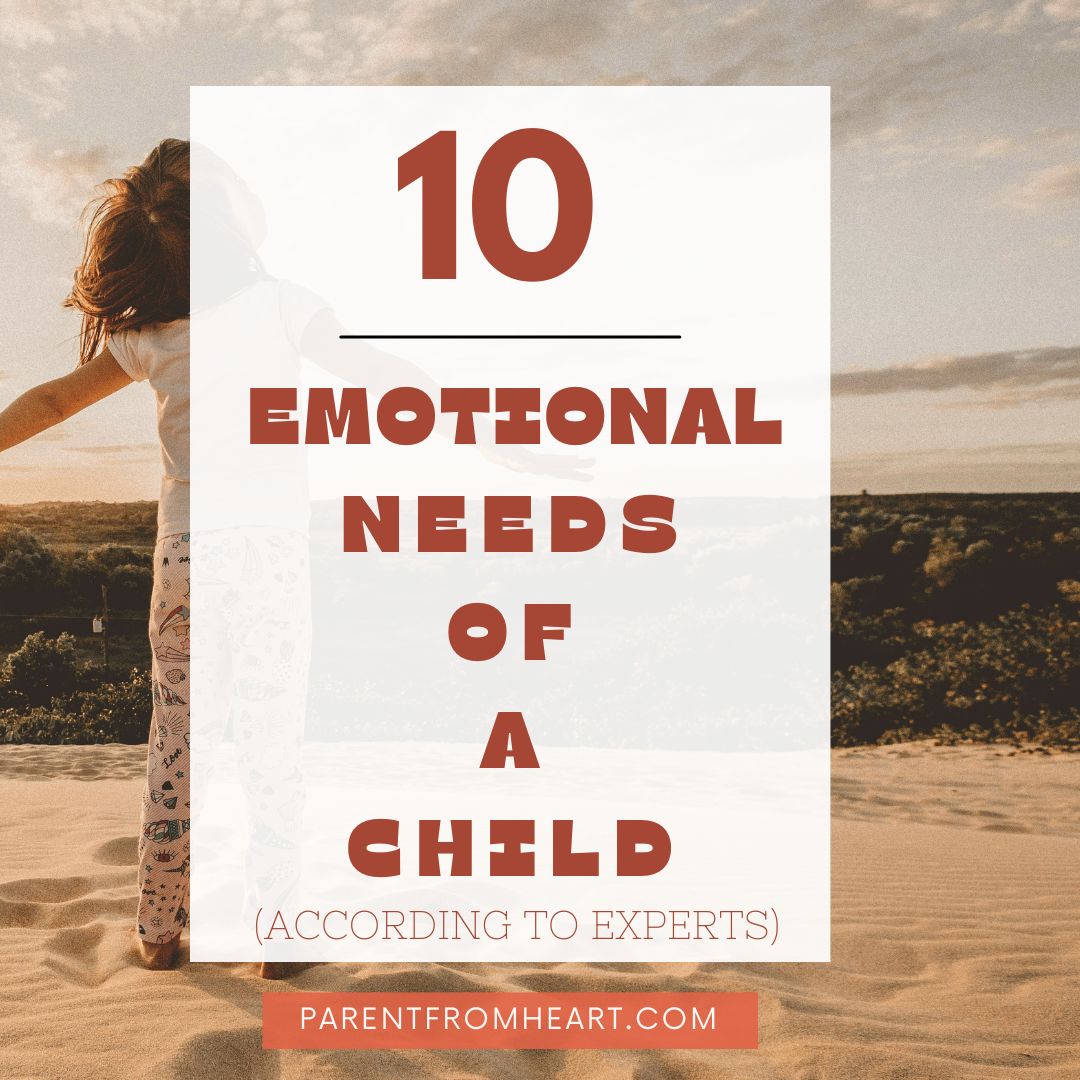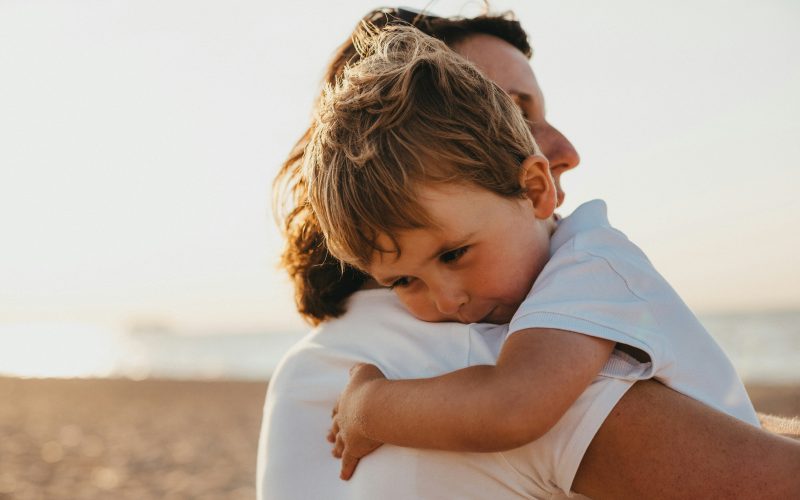Table of Contents
When I scraped my knees as a kid, I remember crying like there was no tomorrow. Then I’d bounce back and continue playing hopscotch with the neighborhood kids. The moment I became a parent, I realized my kids weren’t so different. They might not be having the same playground dramas I did, but they’ve got their own unique set of struggles. So, how do we deal with these delicate situations? By identifying and providing the following 10 emotional needs of a child.

Unconditional Love
What if your child has a booboo or a meltdown over a sandwich that’s “not the perfect triangle”? In these moments when you’re trying not to cry with them, do you know what they need most? It can be a warm hug, a reassuring word, or just the comfort of knowing you’re there for them, tears and all. That’s the magic of unconditional love.
Many studies have demonstrated that children benefit from an environment that provides healthy, unconditional love and acceptance. For example, the research on the importance of maternal love and affection for young rhesus monkeys conducted by the American psychologist Harry Harlow. He asked the question: in situations in which infant monkeys are given a choice between a wire mother with food and a soft, cloth mother (without food), which would they choose? The answer was clear: the monkeys preferred the soft, cloth mother with whom they could feel safe and secure.
Consider the times your little angel does something wrong, like breaking her grandmother’s cherished vase or throwing a fit at Target. When they experience these situations – unconditional love can work like a charm. Most often, telling them you love them in a gentle and supportive way can actually be even more impactful at mitigating anger or disappointment than harsh criticism or withdrawal. By providing a space where your child can make mistakes, you are helping to develop their ability to learn and grow. You are also setting up a foundation of secure love that she’ll benefit from for the rest of her life.
Attention

Our kids crave attention like candy. And it’s true – it is something many of us need more of in this modern, overstimulated rat race. Remember the last time you really looked at your little one closely to take in what they were saying or doing? Are they building Lego towers? Telling you about school? Those are the minuscule moments of attention crucial to kids’ emotional health.
An article in the Journal of Family Psychology discloses how ‘parental attention’ positively correlates to having a happy kid. Give your munchkin the spotlight she deserves! You’ll see how their self-confidence soars. Here is a promise we can make to all the little people in our lives: put down the screens and tune in because our greatest gift is our undivided attention in a world pulling us in many directions.
Security
“Can I have a hug?” I hear this several times daily in our home. I didn’t realize how much this simple gesture meant to them until the hugs became longer and tighter as they grew older. It dawned on me that an embrace isn’t just a hug—it’s their lifeline of security. It ensures them that Mom and Dad will always be there to offer comfort in good times and bad.
Bowlby’s Attachment Theory, an iconic study, identified four main attachment styles kids can have based on how they interact with their caregivers. The first one, secure attachment, reveals that children are more open to navigating their environment when a loved one is there for them. In turn, they form healthy attachments and develop a strong sense of self-esteem.
I clearly remember dropping my kids off at daycare for the first time. Oh, how those big, teary eyes tugged at my heartstrings. It can be a tough moment, but by providing a safe and predictable environment, we’re laying the groundwork for our little one’s emotional resilience and independence. We must be a rock-solid foundation that our kiddos need to spread their wings and soar. Knowing they have a safe harbor to return to in a constantly changing world can be the greatest gift we ever give them.
Validation
How often has your child told you, “Look, mom!”? They’ve certainly brought home their fair share of science and art projects for you to admire. As parents, we must go beyond saying, “Good job”! You’ll witness them beam with pride when you recognize their efforts and tell them their work means a lot to you.
When a parent affirms a child’s experiences, it boosts their self-worth and fills their love tank. Moreover, a kid who feels seen opens up more. You’ll more likely hear their stories about school, their friends, and what scares them. When they have the freedom to open up without fear of being judged, they’ll develop healthy emotional patterns.
Perhaps your child comes to you with tears streaming down their face because of a playground squabble with Jack or Sue. For you, it might just be a childish dilemma so you brush it off. Instead of minimizing their feelings, try validating them. You can say something like, “I can see why you’re upset; that sounds really hard.”
Support

Every Saturday morning, weary-eyed parents, including me, coffee cup in hand, watch our kids play soccer. It does not matter whether it’s scorching outside or there are tons of things on our to-do list. We are there for one thing—to support our kids’ interests. Seeing them thrive as they pursue their passions is a reward we never signed up for but receive with gratitude.
An American Psychological Association journal article suggests that kids with very supportive parents grew up to be relatively psychologically and physically healthy adults. So, being our kid’s staunchest supporters will greatly benefit them in the future.
Children who receive ample support develop resilience and confidence – skills they need to navigate this world’s uncertainties as grown-ups. When they know they can count on you, there’s a huge chance they’ll go on adventures, learn new things, take more risks, and overcome challenges gracefully.
Boundaries
Kids need boundaries to grow up well-adjusted. For example, when your toddler reaches for the cookie jar before dinner, you gently remind him that sweets come after veggies. Subsequently, they throw tantrums, however parents must be firm.
Remember when your child wanted to know how far he could go—perhaps staying awake beyond bedtime or refusing to do household chores? During these times, we must be the “bad cop” and firmly stand our ground. Yes, it’s hard, mom and dad. However, doing so provides our kids with a solid emotional foundation and offers them protection in a world that can get overwhelming.
Parenting education expert Dr. Stephen Bavolek reveals that boundaries help children build important life skills. They learn to be more patient, responsible, and adept at problem-solving and self-control. Boundaries also enable kids to make choices aligned with their family’s values and goals.
Affection
You spend all day wrestling tiny humans away from meltdowns over sippy cups and misplaced blankies. Sometimes, the last thing you want is another snuggle monster clinging to your leg. But before you skip the hug fest, remember that affection is like sunshine for your little one’s emotional well-being.
A 2013 UCLA study showed that unconditional love and affection rewire a child’s brain for happiness! Yep, those snuggles you sneak in before bedtime build a foundation of emotional security. Another study by the Gottman Institute linked affection with higher self-esteem, better grades (because who learns well when they’re worried?), and even stronger communication between you and your mini-me.
Affection isn’t a one-way street. Those tiny arms wrapping around you? That’s pure, unadulterated love radiating back at you. It’s a connection that fills your cup, too. And that feel-good hormone oxytocin flooding your brain? It strengthens your bond with your child, making you a super team ready to tackle anything.
Belonging

Remember that awkward middle school phase when having a squad by your side was the coolest thing? Well, I do. It turns out that the need to belong isn’t just a teenage thing. It’s a fundamental human need, and our little ones need them, too.
We all yearn to be accepted and be part of a group. It makes us feel safe and secure -like we can breeze through this whole life thing. Well, guess what? Kids are no different. A study found that children who feel like they belong at school have a lesser chance of experiencing anxiety and depression.
Children who feel they belong face challenges with confidence and are open to trying new things. Being part of a loving family that accepts them for who they are will allow them to be the best version of themselves.
Appreciation
Between the snack demands and the never-ending questions about life’s mysteries, remembering to say “thank you” can feel like just one more thing on the never-ending to-do list. But showing appreciation points your child’s emotional compass in the right direction.
A study reiterated that genuine praise can lift a kid’s self-esteem and motivation. For instance, your little one is busy stacking blocks. A simple “Wow, that’s such a high tower, I’m seriously impressed!” can brighten their day and encourage them to pursue other creative activities.
When you appreciate your child’s efforts, you teach them the beauty of gratitude. They’ll learn that simple affirming words and actions can make a difference. When your child helps you haul in the groceries, instead of a plain old “thanks,” you hit them with a “Wow, you carried that heavy bag like a champ! You really saved me.” That’s not just teaching them about appreciation—it’s showing them the magic of teamwork and responsibility.
Empathy
You’re at Costco, and your little one suddenly throws a tantrum. There you are in the middle of the cereal aisle, wondering what sparked the meltdown. The key to this mystery might lie in empathy. It’s not mind-reading (although wouldn’t that be handy?), but understanding the world through your child’s eyes. Believe it or not, that tiny human has a whole new perspective to offer.
A recent University of Toronto research found that children who experience empathy can regulate their own emotions better. For instance, your child comes home from daycare all grumpy. Maybe a friend took their favorite toy. Instead of dismissing their tears with a “get over it,” try getting down to their eye level and tell them, “Sounds like you’re feeling sad because your friend has your truck. I feel you, sometimes it’s hard to share”. This simple validation and understanding can stop the tantrum in its tracks.
Children who witness empathy from their parents grow up to be empathetic as well. The kindness they learn from home can spread positivity through the playground, school, and, hopefully, the world.
Raising Emotionally Strong Kids
Parenthood has many loop-de-loops and meltdowns we never saw coming. I know, raising happy, healthy humans is no easy feat, but here’s the beautiful part: we can always offer the top 10 emotional needs of a child to thrive in this world.
Share your tricks for supporting your child’s emotional development. Do you have a bedtime routine that soothes their worries or a simple phrase that lights up their face? Your experiences are like gold nuggets of wisdom for fellow parents navigating this crazy journey.
Like this post? Click on the image below to save it for later!

References:
Harlow H. F., Dodsworth R. O., & Harlow M. K. (1965). Total social isolation in monkeys. Proceedings of the National Academy of Sciences of the United States of America.
Cherry, K. (2018). The story of Bowlby, Ainsworth, and Attachment Theory: The importance of early emotional bonds.
“Emotional Support From Parents Early in Life, Aging, and Health,” Benjamin A. Shaw, University at Albany, State University of New York, Neal Krause, Linda M. Chatters, Cathleen M Connell, and Berit Ingersoll-Dayton, University of Michigan; Psychology and Aging, Vol. 19, No. 1.
Flaherty, S.C., & Sadler, L.S. (2010). A Review of Attachment Theory in the Context of Adolescent Parenting.
Co, P., & Co, P. (2024, February 14). How a Parent’s Affection Shapes a Child’s Happiness for Life. The Gottman Institute. https://www.gottman.com/blog/how-a-parents-affection-shapes-a-childs-happiness-for-life/
Foster, C. E., Horwitz, A., Thomas, A., Opperman, K., Gipson, P., Burnside, A., Stone, D. M., & King, C. A. (2017). Connectedness to family, school, peers, and community in socially vulnerable adolescents.
Dewar, G. (2024, March 8). The effects of praise on kids: 10 Evidence-based tips for better outcomes. PARENTING SCIENCE. https://parentingscience.com/effects-of-praise/











